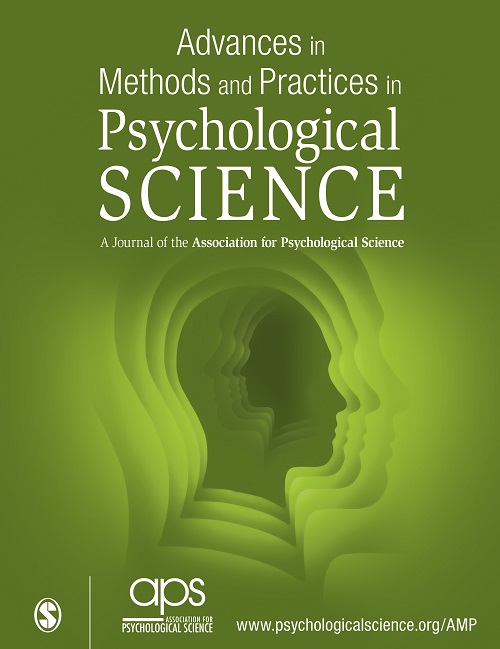带调整误差条的汇总图:在R中实现的出色框架
IF 15.6
1区 心理学
Q1 PSYCHOLOGY
Advances in Methods and Practices in Psychological Science
Pub Date : 2021-07-01
DOI:10.1177/25152459211035109
引用次数: 19
摘要
绘制实验数据可以让研究人员说明研究的主要结果,显示影响大小,比较条件,并指导解释。为了实现这一切,有必要使用误差条显示结果的点估计及其精度。研究人员经常使用一种误差条——置信区间——来传递有限的信息,这可能是他们不知道的。例如,置信区间不允许比较结果(a)组之间,(b)重复测量之间,(c)当参与者在集群中采样时,以及(d)当群体大小有限时。使用这种独立的误差条可能会导致绘图显示与统计测试得出的结论之间的差异。为了克服这个问题,我们建议通过调整结果(置信区间)来推广结果的精度,使其考虑到实验设计和采样方法。不幸的是,大多数专门用于统计分析的软件都不提供调整误差条的选项。作为一种解决方案,我们为R开发了一个开放访问的开源库——非常棒——它允许用户创建带有易于调整的错误条的摘要图。本文章由计算机程序翻译,如有差异,请以英文原文为准。
Summary Plots With Adjusted Error Bars: The superb Framework With an Implementation in R
Plotting the data of an experiment allows researchers to illustrate the main results of a study, show effect sizes, compare conditions, and guide interpretations. To achieve all this, it is necessary to show point estimates of the results and their precision using error bars. Often, and potentially unbeknownst to them, researchers use a type of error bars—the confidence intervals—that convey limited information. For instance, confidence intervals do not allow comparing results (a) between groups, (b) between repeated measures, (c) when participants are sampled in clusters, and (d) when the population size is finite. The use of such stand-alone error bars can lead to discrepancies between the plot’s display and the conclusions derived from statistical tests. To overcome this problem, we propose to generalize the precision of the results (the confidence intervals) by adjusting them so that they take into account the experimental design and the sampling methodology. Unfortunately, most software dedicated to statistical analyses do not offer options to adjust error bars. As a solution, we developed an open-access, open-source library for R—superb—that allows users to create summary plots with easily adjusted error bars.
求助全文
通过发布文献求助,成功后即可免费获取论文全文。
去求助
来源期刊
CiteScore
21.20
自引率
0.70%
发文量
16
期刊介绍:
In 2021, Advances in Methods and Practices in Psychological Science will undergo a transition to become an open access journal. This journal focuses on publishing innovative developments in research methods, practices, and conduct within the field of psychological science. It embraces a wide range of areas and topics and encourages the integration of methodological and analytical questions.
The aim of AMPPS is to bring the latest methodological advances to researchers from various disciplines, even those who are not methodological experts. Therefore, the journal seeks submissions that are accessible to readers with different research interests and that represent the diverse research trends within the field of psychological science.
The types of content that AMPPS welcomes include articles that communicate advancements in methods, practices, and metascience, as well as empirical scientific best practices. Additionally, tutorials, commentaries, and simulation studies on new techniques and research tools are encouraged. The journal also aims to publish papers that bring advances from specialized subfields to a broader audience. Lastly, AMPPS accepts Registered Replication Reports, which focus on replicating important findings from previously published studies.
Overall, the transition of Advances in Methods and Practices in Psychological Science to an open access journal aims to increase accessibility and promote the dissemination of new developments in research methods and practices within the field of psychological science.

 求助内容:
求助内容: 应助结果提醒方式:
应助结果提醒方式:


